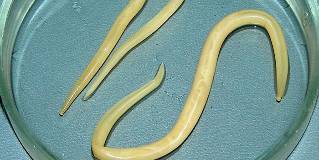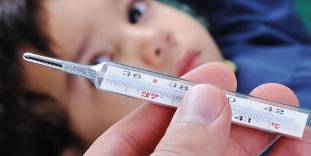The danger of penetration of worms in the body accompanied the man from the first days of life. Adults, the elderly, adolescents and children infected via the hands, food and water. The problem of worm infestation are easily confused with diseases of the gastrointestinal tract. At the onset of symptoms in children is important for tests and to see a doctor. How to bring worms to a child?

From that appear worms in children
The eggs of the worms group of helminth fall in the child into the body through water and food. The main causes of worms eating unwashed fruits and vegetables. Dirty hands, undercooked food, cleaning the water, the flies – all is dangerous. You had come along with the meat and infected, and nematodes are transmitted through the skin by contact with the surface is dirty (if it is to walk on the ground). When this type of food in the interior can be produced enterobiasis (pinworms size of up to 2 cm). Roundworm are transmitted via animals.
What is dangerous
Worms in children is dangerous because it deprives the body of nutrients. Worms feed on useful elements and produce waste which have toxic impact: this can lead to the development of allergic reactions. How dangerous are worms in the tissues of internal organs? If parasites in children implanted in the tissues, violated the integrity of the walls, which can cause bleeding, various diseases (intestinal obstruction), worsening health (disease frequent acute respiratory infections, SARS). The threat to the life are the worms in the lungs.
Types of worms in children
In the child, the body can be damaged by parasites such as the small size and large. The incubation period of the helminths may vary from 1 to 1.5 months. It is very important to determine the type of worms, because this will depend on what medications should be taken. Common varieties of worms in children:
- tapeworms: the cestodes tapeworm, the dwarf tapeworm, the tapeworm, Echinococcus;
- worms segmented: Annelida;
- worms: Trichinella, pinworms, vlasoglav, nematodes, worms;
- koljuchegolovye worms: skrebni;
- flatworms: trematodes, flukes.
How to know if your child has worms
Many parents are interested in how to detect worms. Laboratory diagnosis helps to detect the disease and is a reliable method of determining the helminthiasis. With the early detection of the infestation immediately prescribe a course of therapy with drugs that helps to protect the child from the unpleasant consequences. In some cases, at the time of diagnosing the disease can be visually: the Kale will be present worms. With the defeat of the body by helminth infections may include the following features:
- frequent headaches or dizziness;
- the grinding of the teeth during sleep (bruxism);
- severe fatigue;
- diseases of the digestive tract (constipation or diarrhea);
- excessive boosting of the appetite, or not at all;
- pain in the navel or across the abdomen.

A blood test
Prevention is checked every year for worms in children, especially if the child goes to nursery or school. The main advantage of the ELISA blood test for helminth eggs detection of worms in an early stage. At the time to do a ELISA test should not eat or drink for about 8 hours, to allow the use of the water in small quantities. First thing in the morning on an empty stomach to take blood from a vein. The doctors examine the presence of antibodies to the parasites. Antibodies anti – immunoglobulin protein that is produced in the appearance of parasites in the body. Detection of the protein in the results of the analysis says about the disease.
There are worms in children
Parasites may appear in small children. To achieve that could be at the time of delivery, or as older children, through contact transmission (hands). The situation is complicated by the fact that the children do not have a strong immune system. Your body is not capable of resisting a load in the form of parasites and depleted two times more than an adult. Worms in children (8-12 months) may also result in artificial. Doctors say the best prevention of infection is the feeding of the milk of the mother.
Signs of worms in children
Each variety of worms is characterized by their typical symptoms, but it is possible to assign the common symptoms of worms in children, among which are: anxiety, irritability, pal.lidesa, and dry skin. The baby starts to act, he appeared circles under the eyes. Watching them, the parents have to go to the doctor until it was too late. Among the signs of helminthiasis version:
- the lack of weight;
- in the anus there is redness;
- fever;
- dry cough and no colds;
- abdominal pain, no.
The first signs
To identify the infection parasitic is not easy. The parents of the child should alert to changes in behavior: looks worried and restless, may be present weakness, the manifesto of the skin, rashes, decreased immunity, worsening of appetite or greatly increased. Early manifestations of helminthiasis are a violation of the chair, which are manifest then diarrhea, then constipation. Other first signs of worms in a child:
- sudden nausea;
- increase in salivation during sleep;
- the attacks of pain in the abdomen of the uncertainty of the location;
- the anus begins to itch (pinworm);
- fatigue;
- a bad dream.
Temperature
The increase of temperature to worms in children is not a first symptom of the infestation, but it is considered that an accompanying symptom. Why the temperature rises? If the body is present, ascariasis (infestation of parasitic worms), the eggs are observed in organs and tissues. A large number of them causes the inflammation in which there is fever. Temperature when the round worms due to muscle, pain and swelling of the face. The temperature in worms rises to subfebrile, that is to say, up to 37-37,2°C.
Vomiting
Helminthic infestation in children can cause vomiting and foamy white. The process develops slowly. The initial phase of the disease has a duration of 3 weeks. Next there is a dry cough and skin rashes similar to hives. Vomiting occurs in worms in the child, along with other unpleasant symptoms: excessive flow of saliva, anxiety, and nausea. The first appearance of the white foam gag to analyse the faeces for the detection of traces of eggs from the worm.

Diarrhea
For many of the diseases of the gastrointestinal tract characterized by the same symptoms as in helminth infection. The patient may experience constipation, diarrhea, nausea, vomiting. The parasites are irritating the mucosa of the intestine produces inflammation and diarrhea in worms in children. Reliable indicator of worms is the constant feeling of hunger. The first thing you need to do with this symptom is a sign that the intestinal flora of the region. When helminthiasis palpation causes pain, and you can locate the worms.
Treatment of worms in children
If signs of take your son to the doctor. The pediatrician will have a pre-inspection, write a direction in the analysis, prescribe a treatment regime based on the history, the child's age, weight, extent of infection. There are many effective drugs against entrenched parasites in the body. Treatment of worms in children can occur with the medication and traditional methods.
Scheme
In the standard treatment regime is necessary to carry out the preparation of the measures. For this reason, the paediatrician appointed by vegetable oil, and harmless sorbents. With their help the body is to clean and other waste products from the worms and toxins. The duration of the preparatory phase is five to seven days, after which, together with the faeces released part parasitic worms. Those that remain in the wait for treatment against worms the medicines are able to cure the disease. How to fight parasitic worms in 3 stages:
- The work process consists of reception 1 teaspoon before meals flax oil three times a day and sorbent 1 tablet after a meal.
- Then there are pills for worms for children prescribed by your doctor.
- After the fight take the medication to keep the liver.
Drugs against worms for children
How to check and bring the worms in a child? You need to contact the pediatrician who will help you choose effective drugs. Common drugs against worms for children have a paralytic effect on the muscles of the parasites, which leads to their destruction, and possess a wide spectrum of action.
Folk remedies
Very popular methods of treatment is not due to a destructive, but a mild effect on the human body, unlike drugs. When the expulsion of the worms you need to be confident that the person is allergic to the herbs or idiosyncrasy to the composition, otherwise the treatment may cause damage. That to give a child of worms and how to get rid of them? Herbal treatment of worms in children traditional methods carried out with the participation of infusions and decoctions of the following plants:
- tansy;
- garlic;
- dandelion root;
- the red clover;
- yarrow;
- thyme;
- calamus root;
- wormwood.
The diet
Treatment need to be combined with the diet in worms in children, designed for the rapid removal of parasites worms. Cure children diet of worms differs from the adult, has more of a yogurt containing pieces of fruit and berries. Take care to exclude from the diet of harmful products, soft drinks, candy. Examples of diet against worms:
- To get rid of tapeworms (it had a wide, bullish or pork tapeworm) can help the daily consumption of pumpkin seeds for 7 days on an empty stomach.
- The liver parasite cleanse diet with the use of rice-water, corn or pumpkin porridge, fruits, vegetables, fruits, vegetables.
- Remove manifestations of helminthiasis in the blood will help nuts, brown bread (crust), sea Kale.
Prevention of helminthiasis in children

The main prevention of worm infestation is in compliance with the measures of personal hygiene. Not all adults can take care of themselves, but what happens with the kids? It is the duty of parents to teach and train the little man to the security staff, that is of preventive character, not only for worms. To reduce the risk of infection parasitic worms need:
- before eating, wash your hands;
- pour over boiling water, or simply wash applied to the table fruits, vegetables, citrus, fruits, herbs;
- drink only boiled, mineral or treated water and not raw;
- there are quality products;
- to protect yourself from insects;
- do not swim in places unknown, especially in the summer.



































